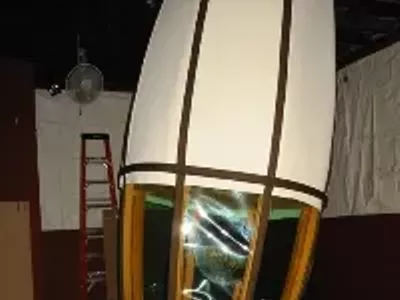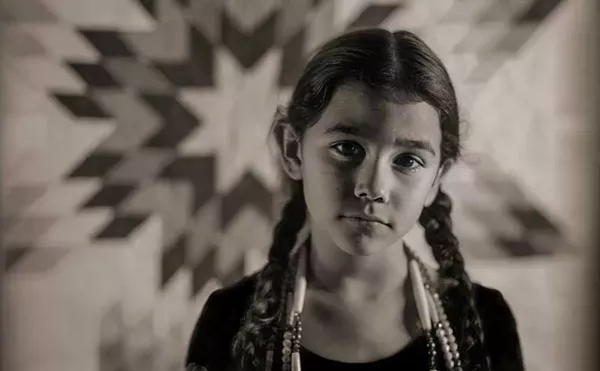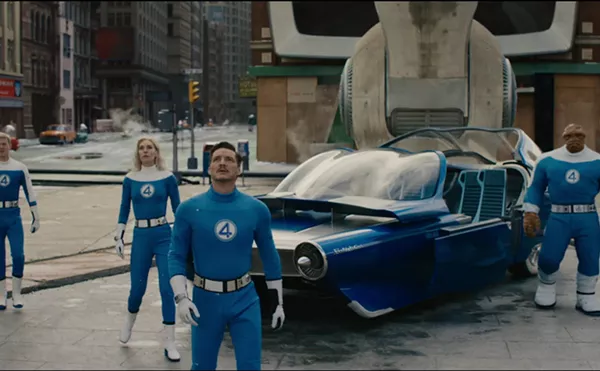
Audio By Carbonatix
[
{
"name": "GPT - Leaderboard - Inline - Content",
"component": "35519556",
"insertPoint": "5th",
"startingPoint": "3",
"requiredCountToDisplay": "3",
"maxInsertions": 100,
"adList": [
{
"adPreset": "LeaderboardInline"
}
]
}
]
Even before her first book of poems, Blue-Tail Fly, was published this past fall, 42-year-old poet Vievee Francis was a vital and well-known presence in the Detroit poetry scene. Now that this book has been brought out by Wayne State University Press, her presence in the literary world has grown beyond the borders of city and state. Most recently, in fact, Poets & Writers Magazine selected Blue-Tail Fly as one of 12 notable first books published in 2006.
Unlike most first books, Blue-Tail Fly does not place the author's personal experiences at the center. Instead, Francis uses the "persona poem" as a way of giving voice to a chorus often unheard. Poems from the point of view of slaves and foot soldiers speak out against presidents and war generals who, though they might confess in private that "my heart is not in this business ... as a military man I am bound to execute orders." In poem after poem, Francis makes the reader feel what it was like to bear such a burden, and at what cost that burden was borne by those on the front lines. Her approach to the process of writing poetry can be captured by these lines from a poem in the book: "Piece by piece a life is reinvented," explains the speaker in Walt Whitman Reads to the Limbless, Dying, "as the song / cobbles over closed eyes." As the poem too closes its eyes, the dying soldiers demand more from the poet. Don't just read to me, they demand. Most importantly, and more urgently: "Write for me."
Vievee Francis recently took time away from her own writing to answer a few questions about the life and work of a poet on the verge of emerging.
Metro Times: I'm interested in your use of persona in your work. Why did you choose to assume other identities, other masks, other voices, from the unnamed war grunt all the way up to Abe Lincoln himself, to say what you had to say?
Vievee Francis: I have always loved the persona piece. To write a persona poem, you have to consider another's perspective, to imagine the world as they might see it, and this frees you up to make discoveries you might not ordinarily make. You suddenly have more range when considering tone, syntax, dialect, etc. Of course, my body of work is not limited to persona, but that is how I was introduced to formal poetry. At the age of 15, in one of those high school survey classes, the instructor read aloud Browning's "Soliloquy of the Spanish Cloister." I was swept up in the voice of the poem, which was that of a monk's. Here was a way to write about feelings, yet keep a kind of distance from the author. One could completely immerse in another.
MT: There is much history in these poems (poems based on letters, based on tales told to you, even the title of the book is taken from the popular song "Jimmy Crack Corn"). How do history and events play into the writing of the poem and the poem itself?
Francis: In Blue-Tail Fly, I write, among other things, about the Civil War. The facts, those things that can be documented, coldly recorded and filed are not enough to understand the dilemma of Lincoln, the complex mourning of both the slave and free communities upon his death, the raging pain of the Irish pressed into the Civil War, the perplexed terror and distress of the black communities targeted during those riots. The facts don't make the open mouthed "O" of devastation when a "colored" troop goes back to the plantation to find that his wife has been killed in retribution. The poet, particularly the lyric poet, can assign emotional weight that will resonate with the reader, in the way music so often does. Poetry breaks up the language, repatterns it, forcing us into new considerations. It is my hope that those lyrics and narratives that lend themselves to new considerations will also lend themselves to empathy.
MT: Where in these poems will the reader find "Vievee Francis"?
Francis: Where am I in these pages? I recently had a discussion with poet-writer David Ebenbach, and he said he might put his own emotions into his characters. I certainly do this, but it doesn't always happen at the point of inception. Take the poem on John Brown, "The Book Speaks of Pretenders." I begin in Brown's voice, which is calm, but it builds into perplexity and rage. I can tap my own emotions there. Brown picked up arms; I write about men who would take such actions. In the final section of the book that concerns "colored troops" during the Civil War, of course I could imbue them with my own hunger for personhood, for the right to fight for that personhood. My arms for me to pick up are my words, my manuscripts, my books.
MT: How crucial is it, to you, to read your work out loud and at public readings, and what is the relationship, when you are writing, between the work on the page and the work as it might later be orally performed and heard by other ears?
Francis: It is crucial to me to read my work to audiences. Voice can layer the poem, provide another valence that can increase its resonance, much the way wordless sounds do for song, the open "O," the moan, the hum, those sounds carry the song farther. Voice can carry the poem farther.
MT: I know that you are a teacher of writing, both with the InsideOut Literary Arts Project and also through workshops that you conduct privately out of your home and out of local cafés. What do you hope they take away from their time working with you? And how does teaching feed or influence your writing?
Francis: Most of my students have not studied poetics or creative writing in school. They went from school to the stage and became professional spoken word performers or went from some reading on their own straight to the open mics around town. What I provide is an old and honorable way of learning poetry. I mentor my students. They are really taking on a kind of apprenticeship. I teach them what I know, and only what I know. For some students, this means the basics: terms, drills, workshops. For others, it means conversation over coffee about Seamus Heaney's new book or a discussion about the "night mind." I have found that what young poets need most in the Detroit area is exposure to contemporary movements and shifts in poetry. They need to love poetry enough to read it, and read in currency. They are not reading enough contemporary poets. There is so much incredible work being done by emergent artists across the country. Poets such as Amaud Johnson, Tyehimba Jess and A. Van Jordan. By now these should be household names to young poets in this area, but they are not. Yet, things are finally changing for several reasons. 1) Journalists and poets like Desiree Cooper are writing more in depth about the contemporary landscape of poetry. 2) InsideOut is putting active poets who actually write and publish into the Detroit public schools. 3) Several poets in their 20s and 30s have banded together to broaden their understanding of poetics through a group founded by Christina Archer — Write Word, Write Now. I currently facilitate the group. When I agree to take on new members, they must agree to teach what they learn. This is primary, because poetry in America is protean, changing every generation or so. Old movements inform or displace new ones. 4) Honestly, there are a few of us out there who are fiercely crossing the old boundaries, lines, borders. We are in a renaissance in American poetics, and I'm committed to making sure this generation of poets doesn't miss it through self-isolation.
Vievee Francis reads from Blue-Tail Fly, along with poets Kawita Kandpal and JoAnna Karner, at 7 p.m., Wednesday, Feb. 21, at Scarab Club, 217 Farnsworth, Detroit; 313-831-1250.
Peter Markus is a poet whose book Good, Brother has been recently reissued. Send comments to letters@metrotimes.com





